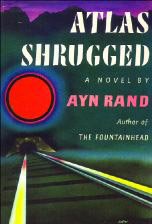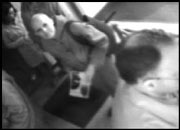If you weren’t at Zadie Smith’s lecture event last week, consider yourself officially outside this column’s target readership—we warned you plenty, and we will get along fine without you. Smith, as a novelist, is deeply interested in obsession; the Nightstand, as a columnist, is deeply engaged in it. So this is our third Zadie Smith article in a month. So deal.
Smith, 27, downs pink cosmos and wears a flower-print pink turban and writes comic novels with “a couple of brown people” in them. She told Matthew Brogan, executive director of Seattle Arts & Lectures, during an onstage interview at Benaroya Hall last week, “For me, to write a book in which there are only white people would be insane.”
She’s the daughter of a Jamaican mother and an English father and was raised in London, where multiculturalism is so two centuries ago. The great English comic novel, she insists, is her aspiration.
“I’m not a huge Virginia Woolf fan,” she said, swiftly capsizing the Nightstand’s long-held conviction that if Virginia Woolf were a star she would be none other than that singular gaseous mass around which our planet rotates, “and I don’t like Ulysses. I love comic novels. I like to make people laugh.”
Critics of The Autograph Man, Smith’s new novel, almost uniformly found its droll humor didn’t compensate for the book’s ostensible paltriness—or, to be more specific, it’s dissimilarity to the loftiness of White Teeth, her at-times-arduous, multigenerational, mixed-race tapestry of a debut. What certain reviewers (hello, Michiko) have failed to recognize in Smith’s new book is that the humor, essentially, is the point. One character in The Autograph Man harbors “an instinctive, inherited fear of the Chinese in any situation other than food delivery.” As one character watches TV, the author observes: “One of the many things TV does not show you is the potential range and horror of the human form. For this alone . . . it is rightly celebrated.”
Smith’s appearance last week, underwritten by the Central District Forum for Arts & Ideas (www.cdforum.org), will be rightly celebrated as one of the smartest, freshest—and, yes, foxiest—local literary events of the year. Brogan introduced Smith, and then Smith strode out in jeans, open-toe shoes, and the aforementioned turban. She slinked to a chair and answered writerly questions (“I don’t write and then revise; I work very slowly all the way through”) and personal questions (“You can’t take everyone you love with you. If I thought about my grandma as I wrote, I wouldn’t write a word”) and addressed the highly speculated upon issue of why she changed her name from Sadie to Zadie when she was 14 (“It’s really very simple. I was in love with a boy whose name began with Z, and I thought it was a good idea”). Then she read aloud from a scene in The Autograph Man in which the main character decides to get shit-faced alphabetically: absinthe, beer, Cointreau. . . .
“All great English comic novels have one great drunk scene,” she said. “Or, in the case of Kingsley Amis, there’s one on every page.”
She wants to write books like Lolita starring characters like Humbert Humbert (“He is repulsive, and yet he draws you in. That’s what I’d like to write”).
An audience member asked whether starting or ending a novel is harder. “I think that anyone who’s read my novels knows that finishing is the big problem,” she said. “There’s always the have-them-standing-at-the-window-and-looking-at-the-sea option, but I’m not quite happy with that.”







